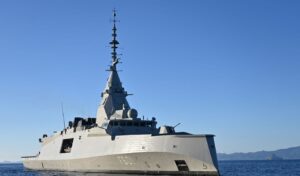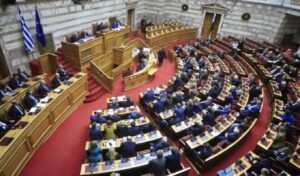Greek Prime Minister Kyriakos Mitsotakis made special reference to defense during his Bloomberg TV interview with John Micklethwait, Editor-in-Chief of Bloomberg News, stating that collective action with the EU and unified decisions are needed on this issue. “We will record a significant primary surplus again this year,” the Prime Minister added at another point in his statements. “The economy is growing and we want wealth to be distributed, and I want to reduce taxes for the middle class,” he noted.
“It was unthinkable a few years ago that Greece would record such growth, while France or even Germany would be in the economic position they find themselves in today,” the Prime Minister commented. Mitsotakis spoke about the Greek economy, saying it is growing, the minimum wage has increased, while incomes are rising for the middle class as well. As he said, from January 1st, citizens will see an increase in their incomes through the implementation of tax reliefs announced at the Thessaloniki International Fair.
The Prime Minister then stated that “since we talk about banking union, we shouldn’t have objections to a foreign bank acquiring a Greek one – this means it has confidence in the capabilities and trajectory of the Greek economy.” Answering a related question, he said that regarding defense, significant decisions must be taken that will require collective cooperation.
Mitsotakis on Bloomberg about elections and cost of living
To the Bloomberg Editor-in-Chief’s observation that a few years ago everyone was blaming Greece, the Prime Minister responded that things have changed, it’s not about “pointing fingers” at who’s to blame, the issue is to see the big picture and have the same common interest, and that sometimes we may need to make difficult decisions.
“The only way to address the cost of living crisis is to strengthen disposable income. This is the only way to combat it. These policies are long-term,” the Prime Minister noted, saying this is an issue evident across the EU.
Regarding the next elections, the Prime Minister noted that New Democracy has won absolute majority twice and will attempt to achieve it again next time. “I believe in governments with absolute majority,” said Kyriakos Mitsotakis, noting however that this is something the Greek people will decide at the ballot box.
“Goal is to increase wages”
He added that “the goal is to increase wages, to achieve convergence with European wages, and to increase disposable income.” He also emphasized that “the Greek government has created 500,000 jobs since taking office.”
“I want the average Greek to feel the benefits of growth, and from January 1st Greeks will see an increase in their incomes, which is very important to me,” he clarified.
“This is what we have done so far and we will continue to do it. And I believe that next year we will be able to talk about positive returns, so I tell my fellow citizens that the best days are ahead of us,” he added characteristically.
“We must put European interests first”
The Prime Minister mentioned that “governments must make difficult decisions to put their finances in order. When they do this, they can enter this cycle that develops the economy, reduces taxes and strengthens incomes. We have reached this point, but we went through a difficult period. Very painful reforms were implemented.”
He then added that he hopes “the political situation in France will stabilize.” “It is very important that Europe’s core, France and Germany, do well.” Regarding tourism in the country, he assured that “it will do very well.”
“Things have changed. The essence is that we must not blame each other. The goal is to ensure collective growth. Through the Draghi report, we see that progress has not been made on all fronts in Europe.” He added that “we must put European interests first.”
Later, the Prime Minister will meet with United Nations Secretary-General António Guterres.
Finally, the Prime Minister will deliver a speech at the 80th Session of the UN General Assembly, focusing on Greece’s upgraded role as a pillar of stability in the Eastern Mediterranean and Southeast Europe.




